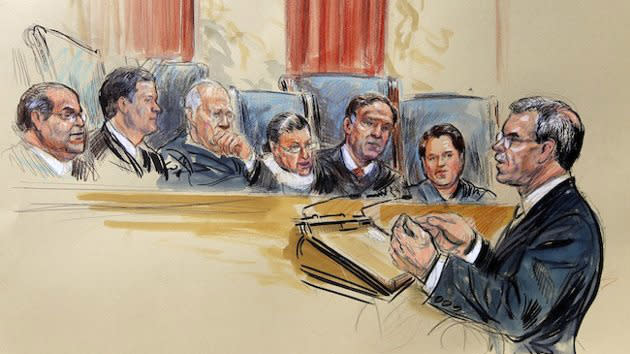 The Lookout
The LookoutObama’s Solicitor General, Donald Verrilli, has rough start at health care oral arguments
Click image to see more photos. (AP Photo/Dana Verkouteren)
Supreme Court justices battered Obama's solicitor general, Donald Verrilli Jr., with questions today, prodding him to explain why the government could compel Americans to buy health care insurance and not, for example, force them to purchase broccoli or burial insurance.
Verrilli appeared to stumble over his words at the beginning of his hourlong questioning, and took a drink of water less than a minute after beginning his statement before composing himself. After the oral arguments were over, some court watchers weren't exactly kind when assessing his performance.
CNN legal analyst Jeffrey Toobin said that the day's arguments were a "train wreck" for the Obama administration and that Verrilli seemed unprepared. "I don't know why he had a bad day," he said. "He is a good lawyer, he was a perfectly fine lawyer in the really sort of tangential argument yesterday. He was not ready for the answers for the conservative justices."
Time Magazine writer Kate Pickert wrote on Twitter that Verrilli "lost his footing a bit," relying on the liberal Justices to remind the other Justices of the key arguments for the law. Washington Post columnist Ezra Klein said Verrilli "lost big."
Lyle Denniston, a long-time court watcher for SCOTUSblog, told Yahoo News that Verrilli did well on the Commerce Clause argument on the whole, but "did not give a crisp reply" when Justice Samuel Alito asked him to express the limiting principle. Alito pressed him to describe how far Congress can go in forcing people to purchase a product in order to regulate interstate commerce. (Alito had earlier asked whether Congress could force Americans to buy burial insurance if the mandate is allowed, under the rationale that everyone dies and must eventually pay for a burial.) "Could you express your limiting principle as succinctly as you possibly can?" Alito asked. Verrilli's answer was a bit convoluted and grammatically confusing.
"When an argument develops a point that crucial, that is when a lawyer must be at the peak of performance," Denniston said. "With that one exception, my sense is that he did very well with the Commerce Clause argument, and that may have helped a great deal."
Tom Goldstein, a lawyer who has argued many cases before the Supreme Court, acknowledges that Verrilli may not be known for his suave style, but told National Public Radio that "ironically, in the Supreme Court, the justices don't admire smoothness and high rhetoric."
At one point, Justice Ruth Bader Ginsburg interrupted Verrilli's response to Justice Antonin Scalia's hard-hitting questions about the limiting principle, appearing to try to help him out. "Mr. Verrilli, I thought that your main point is that, unlike food or any other market, when you made the choice not to buy insurance, even though you have every intent in the world to self-insure, to save for it, when disaster strikes, you may not have the money," Ginsburg said, articulating the government's argument that uninsured people are still part of the national health insurance market.
"That is definitely a difference that distinguishes this market and justifies this as a regulation," Verrilli responded. Later in the questioning, Ginsburg brought up that "a major, major point of your argument was that the people who don't participate in this market are making it much more expensive for the people who do." Verrilli again appeared grateful for the verbal cue, restating Ginsburg's argument.
Obama appointed Verrilli solicitor general last July, replacing now Supreme Court Justice Elena Kagan. Verrilli's interim predecessor, Neal Katyal, defended the health care law in several circuit court cases, which some legal experts speculated would help the administration prepare for the Supreme Court. But these oral arguments mark the first time Verrilli has defended the health care law in court.
According to a recent New York Times profile, Verrilli takes preparing for arguing cases very seriously, even eating salmon before he argues cases because the food is supposed to boost brain function. And he's no stranger to the highest court. He's argued before the Supreme Court 17 times, is an expert in telecommunications law and was once a clerk for Justice William Brennan. He joined the Justice Department in 2009. In his several decades in private practice, Verrilli also took on death-row prisoners' cases pro-bono, ABC News reported. The Supreme Court rejected Verrilli's 2008 case involving two Kentucky death row prisoners, ruling against the argument that the state's lethal injection chemical formula constituted cruel and unusual punishment. Of the five death penalty cases Verrilli has argued in front of the Supreme Court, he has won two.
More popular Yahoo! News stories:
• Supreme Court considers: Did health care challenge come too soon?
• The Supreme Court's health care reform case—What to expect?
• Supreme Court justices challenge Obama administration over health care law
Want more of our best political stories? Visit The Ticket or connect with us on Facebook, follow us on Twitter, or add us on Tumblr. Handy with a camera? Join our Election 2012 Flickr group to submit your photos of the campaign in action.


